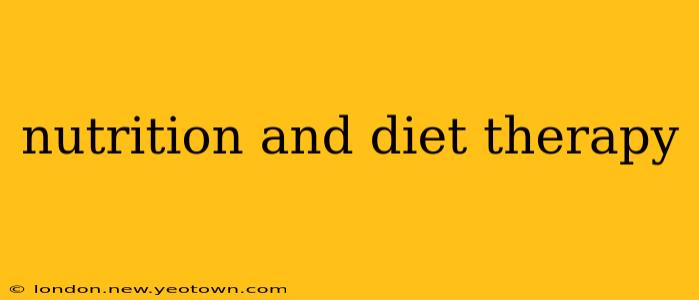The human body is a complex machine, and like any machine, it requires the right fuel to function optimally. This is where nutrition and diet therapy come in. It's not just about counting calories; it's about understanding the intricate relationship between food, our bodies, and our overall well-being. This journey begins with recognizing that nutrition and diet therapy are powerful tools for preventing and managing a wide array of health conditions. It's a holistic approach, considering individual needs, lifestyle factors, and cultural preferences to create personalized plans that promote health and vitality.
What is Nutrition and Diet Therapy?
Nutrition and diet therapy is a specialized field that uses food and nutrients to treat and prevent disease. Registered Dietitians (RDs) and other qualified healthcare professionals are at the heart of this practice. They work closely with individuals, creating tailored dietary plans to address specific health concerns. This may involve managing chronic conditions like diabetes, heart disease, or kidney disease, supporting recovery from illness or surgery, or simply improving overall health and well-being. The cornerstone of this therapy lies in the understanding that food is medicine.
What are the benefits of Nutrition and Diet Therapy?
The benefits extend far beyond weight management. While weight loss is often a goal, the true power of nutrition and diet therapy lies in its ability to:
- Prevent chronic diseases: A well-balanced diet rich in fruits, vegetables, whole grains, and lean proteins can significantly reduce the risk of heart disease, type 2 diabetes, certain cancers, and other chronic illnesses.
- Manage chronic conditions: Specific dietary modifications can help manage existing conditions, improving symptoms and overall quality of life. For example, a carefully planned diet can help control blood sugar levels in individuals with diabetes.
- Boost energy levels: The right nutrients fuel your body's functions, leading to increased energy and improved physical performance.
- Improve mental health: Nutrition plays a vital role in brain function and mood regulation. A healthy diet can help alleviate symptoms of depression and anxiety.
- Support physical recovery: Adequate nutrition is crucial for healing after surgery or illness. It supports tissue repair and strengthens the immune system.
- Improve digestive health: A balanced diet rich in fiber can improve digestive health and prevent constipation.
What are some common conditions treated with nutrition and diet therapy?
Many health conditions benefit significantly from nutrition and diet therapy. Here are a few examples:
- Diabetes: Managing blood sugar levels through carbohydrate counting, portion control, and healthy food choices.
- Heart disease: Reducing cholesterol and blood pressure through a diet low in saturated and trans fats, sodium, and cholesterol.
- Kidney disease: Restricting protein, potassium, and phosphorus to protect kidney function.
- Cancer: Maintaining a healthy weight, consuming nutrient-rich foods, and avoiding processed foods to support the body during treatment and recovery.
- Gastrointestinal disorders: Modifying the diet to manage symptoms of conditions like irritable bowel syndrome (IBS) or Crohn's disease.
- Obesity: Creating a calorie deficit through balanced meal planning and increased physical activity.
How do I find a qualified nutrition and diet therapy professional?
Seeking guidance from a registered dietitian (RD) or registered dietitian nutritionist (RDN) is essential. These professionals have completed rigorous education and training, enabling them to provide personalized dietary advice based on your individual needs and health status. You can find qualified professionals through your doctor, local hospitals, or online directories. Remember to always verify their credentials.
What is the difference between a nutritionist and a dietitian?
This is a question frequently asked. While both professions deal with nutrition, there's a crucial distinction. A registered dietitian (RD) or registered dietitian nutritionist (RDN) is a licensed healthcare professional who has completed extensive education and training, including a supervised internship. They are qualified to provide medical nutrition therapy and are often involved in managing chronic diseases. A nutritionist, on the other hand, may have a varied level of education and training, and their scope of practice may be more limited. It's important to differentiate between these titles when seeking nutritional advice, especially for medical conditions.
What questions should I ask a nutrition and diet therapist?
Before embarking on a nutrition and diet therapy program, it’s essential to have an open conversation with your healthcare professional. Here are some important questions to ask:
- What are your credentials and experience in treating my specific condition?
- What is your approach to nutrition and diet therapy?
- How will you tailor a plan to my individual needs and preferences?
- What are the realistic expectations and potential challenges I might face?
- How will you monitor my progress and make necessary adjustments?
Nutrition and diet therapy isn't a quick fix; it's a journey toward a healthier, more vibrant life. By working collaboratively with a qualified professional, you can harness the power of food to improve your overall health and well-being. Remember, this is a personalized path, and understanding your individual needs is the key to success.

